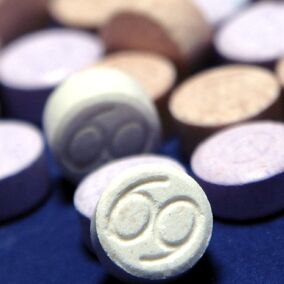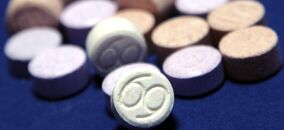Not so long ago, it was pure fantasy to imagine that someone with HIV could live to a ripe old age. But today that’s exactly what researchers are beginning to suggest. At least one credible study makes the case that people with the virus can live as long — and in some cases longer — than their HIV negative counterparts.
The study took a look at nearly 23,000 people with HIV who were taking the medication, in the U.S. and Canada, spanning 2000 to 2007. It found that, among certain subgroups, estimated life span was equal or greater than the general population.
The devil is in the details, of course. The same social and economic barriers that affect most every other aspect of life also affects the longevity of people with HIV.
But we’re taking this as a very, very good sign, so let’s keep up the good work boys, and let’s keep looking for ways we can get similar results for all poz folks rather than just the most fortunate among us.
How about we take this to the next level?
Our newsletter is like a refreshing cocktail (or mocktail) of LGBTQ+ entertainment and pop culture, served up with a side of eye-candy.
Here are five reasons HIV positive guys are living longer…
1. The sooner you know, the better.
You can’t do a damn thing about your HIV if you don’t know you have it. Those who get tested regularly and identify their HIV infection early on are in a much better position to address it successfully.
Speaking of which…
2. Early treatment is the biggest factor in living a normal life span.
The study found that the group who did best started HIV treatment before their t-cells fell below 350. This t-cell number has become a common marker for when to begin taking medications, but not everyone strictly follows it. The men studied who did start treatment with higher t-cells have a life expectancy of 75 years overall, which is equal to the national average for men.
Gay men who started treatment early got two bonus years, with an average life expectancy of 77 years. That’s over the national average for men.
3. Guys living with HIV are receptive to preventative health measures.
Whether is it nutrition, exercise, or taking an aspirin each day to prevent a heart attack or stroke, men living with HIV have more skin in the game. But they aren’t coming up with these ideas all by themselves. They are more likely to know about them because…
4. Gay men living with HIV have a better connection to health care.
Something or another is going to kill us all eventually, but guys with HIV are often more closely monitored than the rest of us. Consistent visits to the doctor as we age means regular blood screenings and physical examinations. Other conditions are more likely to be identified and addressed earlier than among the population at large.
5. Sadly, social and economic realities play a large role in longevity.
Increased life span for people with HIV suffers from the same barriers as does treatment and prevention: lopsided outcomes between the haves and the have-nots. While relatively privileged gay men enjoy better access to health care and treatment, those living in poverty or who are disenfranchised by racism and homophobia do not fare as well.
In fact, successful outcomes for people with HIV have a much to do with social issues — stigma, poverty, shame, isolation — as it does with early treatment. One stifles the other.
There is a quantity vs. quality argument to be made. While treatment side effects have been minimized in recent years, people with HIV have the burden of the sheer expense of health care and treatment, not to mention the social stigma that continues to plague gay men. That’s why guys with HIV have become so vocal about fighting prejudice and educating others. Fighting back is good for your health.
The bottom line: if you are sexually active and at risk, get tested every few months. Reduce your exposure through safer sex and new prevention techniques like pre-exposure prophylaxis (PrEP).
Should you test positive, do everything you can to take advantage of treatments that can mean a long and engaged life ahead.
Related Posts:
Ten Things Positive Guys Want Negative Guys To Know
Get Ready for Ten Things HIV Negative Guys Really Need Positive Guys To Hear
Don't forget to share:






































































jason smeds
The thing about having HIV is that it usually means you are taking risks. You are taking risks by choosing to take drugs, you are taking risks by choosing to be promiscuous, you are taking risks by partying too hard and depriving yourself of much-needed sleep…all these things. It’s symptomatic of poor lifestyle choices.
hassia
@jason smeds: You obviously have a too close relationship with your meth dealer.
Mark
@jason smeds: Really? THAT’S what you took away from this article? The majority of new infections are the result of sex with a primary partner — a lover or fuck bud — who in many cases did not know they were positive. Yes, meth addicts have a higher likelihood to become positive. But most infections occur the old fashioned way, because someone was engaged in perfectly normal, non-promiscuous, non-drug behaviors. Labeling people with HIV as promiscuous drug addicts is just lazy, and doesn’t account for the fact that we’re simply human.
DerekR
@jason smeds: Please keep in mind that Jason/Jim/Petey does not believe HIV causes AIDS. He believes partying, drugs, staying out late and backrooms cause AIDS. But don’t ask him to explain HIV in Africa, heterosexual women or other non glory hole surfing populations.
What’s the point of banning a troll if it’s so easy for him to slither back on with a different name?
stanhope
@jason smeds: are you really that big of an imbecile? HIV has affected friends of mine who were never promiscuous, never partied and did not frequent “back rooms.” People like you are no better than the republicans, religious right, and other nit wits. Perhaps until you become educated, you should just STFU and sit in a corner and read something enlightening. Oh I forgot, you have no friends to give you reading material.
TrueWords
15 Ways to Live to be 100 When You Have HIV
An HIV diagnosis was once a death sentence, but that is no longer the case for those of us who stay healthy. In fact, the average HIV-positive person today is expected to live to be nearly 80, roughly on par with the general population. As more and more people reaching the century mark, here’s a list of the best things you can do — besides adhering to your medication regimen — that’ll help you have a long, healthy life.
1. Keep Your Head in the Game
Depression, stress, and anxiety are tough for people to overcome, but these conditions can also harm your immune system. Psychotherapist Melissa Lopez works with her HIV-positive patients to develop a plan once their moods start to sour.
”When you’re already working with a compromised immune system, pre-depression or anxiety can bring on a lack of motivation,” she says, which can lead to people slacking on their meds. Lopez suggests finding a professional counselor, especially when you’re first diagnosed with HIV, to form a plan to deal with anxiety, depression, or other negative feelings. ‘
‘Know the symptoms of depression, know the symptoms of anxiety, so you know what’s happening to you,” she says. ”You have to be proactive to prevent another, deeper cycle of depression.”
2. Beat Back the Blues
Even when things don’t seem like they’re going your way, looking at things with a positive attitude may be enough to help you get through a tough situation, and even live longer. One study indicated that people in their 20s who used mostly positive, affirmative words to describe themselves were more likely to live into their 80s than those with negative outlooks. Additionally, people with a more positive view of life tend to have fewer strokes, coronary problems, injuries, and colds, and positive-thinking women have healthier pregnancies.
3. Nurture Your Gut
The lymphoid tissues in a person’s stomach are filled with T cells. Because HIV affects T cells, many people with HIV have gastrointestinal problems, but a healthy GI tract is crucial to proper absorption of antiretroviral medication. Some anti-HIV meds need to be taken with food to assure this absorption and avoid potential side effects such as diarrhea. Many HIV-positive folks could also benefit from probiotics and a high-fiber diet, APLA’s expert Brian Risley says.
4. Shake Your Groove Thing
Exercise helps control your weight, fights cardiovascular disease, and lets you look fantastic in an old pair of jeans, but it can also help boost your T cells. Brian Risley, the manager for treatment education at AIDS Project Los Angeles, says some studies have shown that moderate activity, even in short bursts, spurs an uptick in T-cell counts, even when it doesn’t have a serious effect on viral load. Exercise can also help you feel better between your ears.
Says Lopez: ”Exercise is beneficial because we produce hormones that help calm us down when we exercise.” According to the Mayo Clinic, most people should aim for at least 30 minutes of physical activity each day.
”Walk, go to the gym, dance around your house,” Lopez adds. ”Anything is good, as long as it makes you feel good.”
5. Listen to Your Inner Music
Loss of brain function is often a difficult side effect of both HIV and aging. Galina Mindlin, MD, coauthor of Your Playlist Can Change Your Life, has created Brain Music Therapy, a method of converting a person’s brain waves into music to help them concentrate, sleep, and deal with stress or depression. But, says Mindlin, your medulla oblongata doesn’t need to be the next Mozart to benefit from music. Any song from your playlist that calms you can be Kayne West, Ozzy Osbourne, or Native American flute solos can help you rewrire your brain and change your behavior in as little as two weeks if you play it twice a day for five minutes.
6. Get Jiggy With It
Orgasms can be wonder drugs in themselves: They help you sleep, boost your immunoglobulin levels (which fight infections), and reduce stress and depression. So get it on once or twice a week, just don’t forget to play safe.
7. Have a Little Faith
No matter if you worship in a cathedral, a temple, or on the sofa, most physicians believe that some form of spirituality can help people better cope with their health problems. Religion can also help you build their social circle and feel generally more positive.
8. Make Friends —Not Just the Online Kind
Having strong relationships with other people can be a matter of life or death. A joint review by Brigham Young University and the University of North Carolina at Chapel Hill of existing research on the topic found that people with weak social connections were 50% more likely to die in the research’s follow-up period ”an average of 7.5 years” than their peers with strong social bonds. To fight feelings of loneliness, Lopez encourages joining support groups for people with HIV or finding friends or family members you can depend on to let you vent to every once in a while.
”Do not isolate yourself, and don’t make [HIV] a secret,” Lopez says. ”I always think that clients, no matter how long they’ve been living with HIV, should find other people to talk to.”
9. Kick the Habit for Good
It’s common knowledge that cigarettes are bad for everyone, but an estimated 60% of HIVers still smoke.
”In the beginning, when people had an AIDS diagnosis and they were given eight to 16 months to live, we overlooked their smoking habit,” Risley says. As people are living longer, it’s important to remember that smoking may cause mitochondrial infections’mitochondria are an energy-producing feature of human cells. Also, some people with HIV have a heightened susceptibility to cardiovascular disease, and smoking compounds that risk. Plus, of course, there’s smoking’s association with lung cancer.
10. Take Your Vitamins
Many doctors recommend their patients take a general multivitamin to supplement their diet, but HIVers can also benefit from supplements like selenium, which has been shown to boost immunity in HIV patients while suppressing level of virus in the body. Other helpful supplements include vitamin D and calcium for bone health, and iron to fight anemia, especially for menstruating women. Still, those with HIV should also be careful of some supplements that might have averse reactions to antiretroviral treatment. Risley says Saint-John’s-wort, for example, does not mix well with antiretrovirals or some other drugs, like statins, which lower one’s cholesterol. Talk with your doctor, then take your Flintstones.
11. Get Testy
People tend to experience a drop in testosterone levels once they advance past the age of 50, but HIV can also lead to a sharper drop in the hormone. Constant fatigue can be an indication that the virus is affecting your testosterone. While some doctors may write you off as just being tired from having the virus, Risley says both men and women should insist on being tested for chronic testosterone loss if fatigue is a persistent problem. If your levels are low, you and your doctor may want to consider testosterone replacement therapy to help you stay alert.
12. Skip the Sushi
When your T-cell count goes below 200, you become more susceptible to bacterial infections. Risley suggests avoiding raw foods like sushi or oysters, which may contain fungi or bacteria. You should also avoid soft cheeses made from unpasteurized milk (Brie, Camembert) and any with mold (Roquefort or other blue cheeses). All meats should be well cooked, and leftovers should be refrigerated immediately or tossed out. Risley also suggests the same cooking method for those who use medicinal marijuana. ”I’ve heard a few doctors who tell their patients who smoke marijuana, to nuke it in the microwave for 30 seconds,” he says. ”That kills a lot of the trace bacteria or fungus that may remain on the plant.”
13. Hose Down Your Veggies
Even if thinking about all the hands that have touched your produce from the farm to your table doesn’t give you the willies, Risley suggests using a fruit- and vegetable-specific spray to clean raw produce. Even better, you can make your own veggie wash, one part vinegar to three parts water. Wash, rinse, eat —what could be simpler?
14. Build Your Own Dream Team
Not everyone can afford a team of celebrity doctors, personal chefs, and expensive therapists, but most HIVers have access to qualified professionals at local HIV clinics and organizations. Consider talking to a nutritionist to find out which foods that are right for your needs as well as seeing a qualified counselor to determine a plan to strengthen your mental health. While professionals at private practices may unaffordable for some people, many offer a sliding fee scale, with the fee is based on what you can afford to pay. Don’t be afraid to ask. Lopez also suggests doing some research to assure that a potential therapist has some understanding of HIV/AIDS, and any community or culture that you may also identify with, like Asian, African-American, Latino, or LGBT.
15. Consider Personalized Meds
One of the burgeoning trends in the medical field is personalized medicine for a patient based on their demographic information and genes. ”We’re going to have a lot more genetic tests for people to specifically tailor medication,” Risley says. ”We just assume that if you take this one particular medication, your body will absorb it, but not everyone has the same absorption capabilities.” While genetically tailored treatment is not widespread, it may be soon. Talk to your doctor about developments regarding ailments such as depression, colorectal cancer, and chronic obstructive pulmonary disease.
curan
In a sober and objective analysis, HIV infection has drastically less impact now than in the early years of the epidemic.
With modern medications and health care, plenty of classical diseases are now far more dangerous.
http://www.spectator.co.uk/features/9185591/why-id-rather-have-hiv-than-diabetes/
TrueWords
The trick is getting proper medication and sticking to it…this is the REAL struggle of ALL chronic diseases HIV included…you must also accept that there are some things that you can not do anymore and there are some things that you HAVE to do…it is a circle of acceptance that will increase your chances of living a long life…
Remembering to take medications
?Fill a pill organizer once per week to make it easier to take your medications. Keep this box where you will see it.
?Get in the habit of taking your medications with an activity you do daily (eg, brushing your teeth).
?Use a cell phone, pager, watch, computer, personal digital assistant (PDA), or other electronic alarm to help remind you to take medications.
?Keep a back-up supply in a handbag, backpack, or at work, in case you forget your pills. Your healthcare provider may ask you to bring your pill bottles to your visit; this is a good way to be sure that you are taking the correct medication and dose and that your doctor is aware of ALL the medicines you take. Get a written copy of your treatment plan at the end of each visit.
?If your sleep, work or school schedule, or your responsibilities at home interfere with taking your medication on time, discuss this with your provider. Plan ahead for weekends, vacations, and other changes in your routine.
?Using alcohol or street drugs (yes this means Meth) can make it hard to remember to take medications on time. Be honest about these issues with your provider before agreeing to a treatment plan.
?It is important to take all of the medications in your regimen each and every day. Taking only a portion of the HIV medications can lead to resistance. When resistance occurs, that medication is no longer effective against your HIV infection.
?Call your healthcare provider’s office immediately if you have difficulty getting any of your prescriptions filled. Pay attention to renewal notices you get in the mail and requirements for medication insurance coverage. If you think your insurance coverage may be changing or may be terminated, let your provider or social worker know as soon as possible. Check with your provider or social worker if you are thinking about changing your medication insurance plan electively. Some plans may be better than others with respect to HIV medications.
?Never change the number of pills or stop your pills without speaking with your clinician.
Read
We are addressing mentioned at the end of the article –specifically stigma, shame, isolation, and meaningful relationships, at FRIENDS IN DEED, a NYC drop-in center. All long-term survivors are encouraged to check it out. http://www.friendsindeed.org/blog/2014/10/16/88axcjhbe0owihk3w9aas6v8vwboh5
TrueWords
@Read: Sounds like a great thing…many people who are HIV+ are filled with shame and this creates a box for many that spirals out of control and can destroy health both mental and physical…
onthemark
@TrueWords: #9 stop smoking, yes yes yes yes yes! That’s a horrifying statistic, if 60% of HIV+ are smokers. Although I almost want to say… really, ONLY 60%?
#10 vitamins, yes yes yes. I get annoyed at HIV sites like The Body where I’ve seen M.D.s actually say “don’t bother with vitamins.”
#12, sushi & oysters. Tough one for me, I love both of ’em. Double whammy: I was stationed in Japan in the military, and now I live in New England near the beach. So I try to keep it a twice a year occasion (at reputable establishments! – like the TV commercial says, gas station sushi is always a mistake). You mention a T-cell count of 200 – so if someone is way, way higher than that and doing great, it’s not much of a concern? … Have never heard ANYONE (including M.D.s) say that brie & roquefort are a problem, but can do without those, and what you say makes sense.
#13, I always forget that one but seems easy enough.
Most of the other stuff used to seem like touchy-feely b.s. to me, but over time I realized the value.
Stache99
@jason smeds: You should stay out of these discussions as others have pointed out. Yeah, poor lifestyle choices can be a contributing factor but that’s it. Plenty of people didn’t do that and are still positive.
Instead of taking any kind of scientific approach you take the typical childish religious way that any facts that get in the way of your beliefs are just ignored. Just like you’ll ignore this as you have since you took the screen name Jim Bryant.
MarionPaige
So what, Aids is now a manageable incurable illness like diabetes? The medical industry looks at “manageable incurable illnesses” like diabetes as “profitable long term care”. Shouldn’t it be pointed out that making an illness manageable is far more profitable to the medical industry than wiping out that illness?
There is an old Star Trek episode in which the Enterprise came upon this society that had turned war into a manageable non-destructive thing by having computers simulate bomb attacks and to then have people politely and calmly walk into extermination chambers if they were unfortunate enough to have been “killed” by a computer simulated bomb.
The society in question bragged that they were able to have an orderly society that progressed without the destructive effects of war. However, the war in question had been going on for centuries. The Enterprise pointed out that war should be destructive because TAT DESTRUCTIVENESS is the biggest incentive to end it.
onthemark
@Stache99: I like how “jason” is so obsessed with the problem of getting enough sleep. Hopefully he will go into hibernation! We could poke him with a stick on February 2 like Punxatawney Phil the groundhog.
Stache99
@onthemark: Probiotics was mentioned by my Doctor to help the immune system.
starshipcaptain
@jason smeds: Thank you for post; it provoked many well-informed responses that were much more helpful than your original comment. Ignorance is also a lifestyle choice; you should reconsider your own poor lifestyle choices.
onthemark
@Stache99: Glad to hear it. I only hear about stuff like probiotics from poz, self-taught “amateur-physician” types.
TrueWords
It is essential to keep your gut healthy whether you have HIV or not…
I love Kefir it is awesome and VERY tasty…I have it everyday…Trader Joes sells it and it is full of good probiotics
TrueWords
When most people think of their immune system the last thing that comes to mind is the large intestines. However, thanks to emerging research and high profile ad campaigns by companies like Dannon® yogurt, people are getting introduced to the connection.
Our large intestines are inhabited by trillions of bacteria often referred to as probiotics (pro=encouraging, biotic=life). These bacteria composed primarily of acidophilus and bifidobacterium species are introduced to our system during the birth process and play a crucial role in our health. Without probiotics, humans would be extremely vulnerable to food borne illnesses, be deficient in key nutrients and vitamins, and have a much weaker immune system in general.
Lifestyle factors play a significant role in determining how friendly our large intestines are to hosting these important bacteria. Eating a diet high in sugar, fat and processed foods prevents them from growing and thriving. Consumption of fiber from fruits, vegetables and whole grains along with lean proteins like fish, chicken and turkey helps to create an environment that promotes the growth of probiotics. In addition, the frequent use of antibiotics in our society can greatly disturb the probiotic flora in the gut. Although these antibiotics are intended to kill only the bad bacteria, they also affect the good ones. This is why many people experience diarrhea and yeast infections when they take antibiotics. As the good probiotic bacteria are killed, bad (pathogenic) organisms like yeast are able to get a foot hold in the system. Frequent or long term antibiotic use can dramatically alter the gut flora and can be a significant contributing factor to other long term health problems related to immune dysfunction and intestinal conditions.
Protecting the System:
Probiotic bacteria are unique in that they do not cause infection and actually help to prevent infection from other aggressive micro-organisms related to food borne illnesses like salmonella and bacteria associated with traveler’s diarrhea. When healthy populations of probiotics are present in the large intestine, other bacteria that can potentially make us ill are crowded out, preventing them from causing a major infection. Without them we would be extremely susceptible to food borne infection.
The role of probiotics in immune function has been studied for decades. Scientists were curious as to why our bodies would strike up such a close relationship with these bugs. The most crucial role probiotics seem to play for humans is that of training the immune system. Most people don’t know that 60-70% of their immune system is located in the gut as a vast network of lymph tissue referred to as GALT (gut associated lymphatic tissue). The probiotics in our gut are constantly interfacing with the GALT and essentially priming the immune system for contact with other bacteria. They serve as a way for the body to learn how to respond to bacteria without actually having to suffer an infection. This becomes particularly important in young children whose immune system is in constant state of development until about age 7.
Due to the immune system’s essential role in allergies, probiotics are closely related to mediating certain allergy symptoms. Atopic dermatitis is an allergy related skin condition often affecting babies and young children. It is characterized by red, extremely itchy skin and is closely correlated to the development of asthma later in life. Probiotic supplementation to babies and children suffering from atopic dermatitis is very effective at reducing the symptoms and can often result in total resolution of the condition.
Foods like yogurt are made by using these probiotics (acidophilus and bifidobacterium species) to culture the dairy product. Some residual live organisms are left in the final product and these can help to support healthy bacterial levels in the gut. However, most store bought dairy products do not contain any live organisms by the time the product hits the shelves. For this reason, taking a high quality probiotic supplement is the best way to guarantee maximum health benefits.
Another great option for supporting optimal probiotic levels is to learn how to make your own cultured foods using acidophilus and bifidobacterium as the starter bacteria. Recipes for homemade yogurt, keifer, sauerkraut and other cultured vegetables are readily available. Acquiring probiotic organisms from food is the preferred method for the body.
vive
IMPORTANT CORRECTION – Please Queerty, don’t provide misinformation that might affect people’s long term health, AND cause more infections.
You said: “The study found that the group who did best started HIV treatment before their t-cells fell below 350. This t-cell number has become a common marker for when to begin taking medications, but not everyone strictly follows it.”
I believe this is incorrect – the standard of care is now tho start treatment IMMEDIATELY upon diagnosis. It is NOT the standard of care anymore to wait until T cell counts drop. This is important not only for the infected person (there are some patients being studied in whom VERY early treatment could conceivably have eliminated the infection), but also an important “Treatment as Prevention” (TASP) measure to avoid infecting others.
MarionPaige
you can buy kefir grains and make your own kefir, same is true for yogurt. however, i read that kefir does not change /ferment the lactose in milk so, if you you can’t digest lactose (the sugar in milk) having undigested lactose in your gut is probably worst that not having kefir at all.
there was a product sold in the US from Germany called Lactopriv which was a way of getting lactobacillus bifidus without milk.
jason smeds
HIV by itself is not the cause of AIDS. If you have two people, one with HIV who leads a good lifestyle and another with HIV who takes drugs and parties hard, the latter is the one who will be most affected.
Keep in mind that the status of your immune system is affected by MANY factors. Even if you don’t have HIV, your immune system can decline significantly due to poor lifestyle. Any immunologist will tell you this.
My point is that HIV and the associated decline of health is due to an overall package of poor lifestyle choices.
MarionPaige
there is a video out there of aids activist / singer Michael Callen in which he recounts all of the STDs he contracted before being diagnosed with Aids. The video is “Michael Callen – featured in film “Positively False – Birth of A Heresy”. Callen listed so many STDs you wonder how he could remember them all. Callen died many years ago, he also played the HIV virus in the movie Zero Patience
Mark
@vive: When to begin ARV therapy has always, first and foremost, been the individual decision of the patient. Secondly, current NIH guidelines call for treatment when t-cells fall below 350, while others recommend treatment begin when t-cells fall bellow 500.
There is no universal guidance, nor should there be, for patients to automatically begin treatment regardless of their blood levels. For you to contend there is, well, that’s misinformation indeed!
TrueWords
http://aidsinfo.nih.gov/education-materials/fact-sheets/21/52/when-to-start-antiretroviral-therapy#
When is it time to start treatment with HIV medicines?
Treatment with HIV medicines (called antiretroviral therapy or ART for short) is recommended for everyone infected with HIV. When to start ART, however, depends on a person’s unique needs and circumstances.
What factors influence the decision to start ART?
The following factors influence the decision to start ART:
A person’s CD4 count and other test results
Pregnancy
HIV-related illness or AIDS (AIDS is the most advanced stage of HIV infection.)
A person’s ability and willingness to commit to lifelong treatment with HIV medicines
Why is a person’s CD4 count an important factor in deciding when to start ART?
A CD4 count measures the number of CD4 cells in a sample of blood. CD4 cells are infection-fighting cells of the immune system. HIV attacks and destroys CD4 cells, making it hard for the body to fight off infection. A low or falling CD4 count indicates that HIV is advancing and damaging the immune system.
The U.S. Department of Health and Human Services (HHS) provides guidelines on the use of HIV medicines to treat HIV infection. The HHS guidelines recommend ART for everyone with HIV, but the recommendation is strongest for those with CD4 counts less than 350 cells/mm3. (The CD4 count of a healthy person ranges from 500 to 1,200 cells/mm3.) If an HIV-infected person’s CD4 count is less than 200 cells/mm3 or falling rapidly, there is greater urgency to start ART.
Once a person starts taking HIV medicines, an increasing CD4 count is a sign that the immune system is recovering.
Saint Law
@jason smeds: Stats would dictate that given the number of your posts you would manage to say something insightful, funny or even interesting, just once – if only by accident.
And yet…
DistingueTraces
@TrueWords: companies like Dannon yoghurt, eh?
Mark
@DistingueTraces: Anyone who references “Lush Life” in their profile name is okay by me.
dunner
i live in sf i turned poz in 2002 i had a very high load i took the meds i have no load my tcells are over 1200
vive
@Mark: “Secondly, current NIH guidelines call for treatment when t-cells fall below 350, while others recommend treatment begin when t-cells fall bellow 500.”
Please note that your information is outdated. Here are the newest CDC guidelines: http://aidsinfo.nih.gov/contentfiles/lvguidelines/adultandadolescentgl.pdf
Here is what they say:
“Antiviral treatment is recommended for ALL HIV individuals to prevent the risk of disease progression.”
“Deferring ART until CD4 count declines put an individual at risk of AIDSdefining
conditions has been associated with higher risk of morbidity and mortality (as discussed below).
Furthermore, the magnitude of CD4 recovery is directly correlated with CD4 count at ART initiation.
Consequently, many individuals who start treatment with CD4 counts 500 cells/mm3 after up to 6 years on ART
”
“The recommendation to initiate ART in individuals with high CD4 cell counts—whose short-term risk for
death and development of AIDS-defining illness is low6,7—is based on growing evidence that untreated HIV
infection or uncontrolled viremia is associated with development of non-AIDS-defining diseases, including
cardiovascular disease (CVD), kidney disease, liver disease, neurologic complications, and malignancies.”
vive
Also, from page E4:
“The adjusted mortality rates were significantly higher in the 6,935 patients who deferred therapy until their CD4 counts fell to 500 cells/mm3 (risk ratio: 1.94; 95% CI, 1.37–2.79).”
vive
And http://aidsinfo.nih.gov/contentfiles/lvguidelines/adultandadolescentgl.pdf
page E4:
“With a better understanding of the pathogenesis of HIV infection, the growing awareness that untreated HIV infection increases the risk of many non-AIDS-defining diseases (as discussed below), and the benefit of ART in reducing transmission of HIV, the Panel recommends initiation of ART in patients with CD4 counts > 500 cells/mm3.”
vive
Sorry, one of the quotes was messed up, maybe because less than was read as a tag:
“Deferring ART until CD4 count declines put an individual at risk of AIDS-defining conditions has been associated with higher risk of morbidity and mortality (as discussed below). Furthermore, the magnitude of CD4 recovery is directly correlated with CD4 count at ART initiation. Consequently, many individuals who start treatment with CD4 counts less than 350 cells/mm3 never achieve counts >500 cells/mm3 after up to 6 years on ART.”
Alfredo
I just turned 70. My beloved died in 1988, at the height of the epidemic. I married my new companion, after 19 years, in 2013, yet I find no doctor willing to find out why I have survived so long. Remember, doctors exist to prolong life so they can cash in, no to improve the quality of life. I have no support network. There must be others like me out there, but I do not know how to find them.
vive
@Alfredo: “I find no doctor willing to find out why I have survived so long.”
There is a lot of research being done on people like you. You may qualify for the HIV+ Long-Term Non-Progressor Study run by the NIH. For more details see http://www.niaid.nih.gov/volunteer/hivlongterm/pages/default.aspx
Their contact numbers are: 1-800-411-1222 or 1-866-411-1010.
There are also other studies and other people you can contact. Simply google “Long-Term Non-Progressor” or “elite controller” for a number of relevant links.
TrueWords
@DistingueTraces: I make my own Kefir…it is FAR superior to store bought products…
but if you must buy it…check out this link
http://www.sfgate.com/food/tasterschoice/article/Trader-Joe-s-kefir-stays-ahead-of-the-pack-4704163.php
NiceNCool1
@TrueWords: Quote: “7. Have a Little Faith”
Speaking for myself my life has been 100% better since I gave up “faith”. My atheism has been a source of strength for me that can never have been gained through the disempowerment of “faith” because of all baggage that comes along with it.
Austin77
There’s also an HIV vaccine currently in phase 1 trials in the UK. It’s possible that such a “vaccine” might even work post-exposure (an Ebola vaccine developed using similar methods seems to help fight off the virus).
TrueWords
@NiceNCool1: I am an atheist…my faith is all about centering myself…focusing on my life and cleaning out the clutter…faith can be a way to connect to others and strength yourself…I tend to agree with you it is FULL of excess baggage and grand standing however there are some institutions that are inclusive and LOVING of gays…I tend to use faith by holding hands with my husband while going on a walk…we did it yesterday…strengthening and LOVING each other while loving ourselves…
Alan down in Florida
@TrueWords: I am not an atheist but I don’t believe in religion. Faith doesn’t require religion. Faith is belief in things you can’t prove or can’t control. I think the comment “Have a little faith” was more a nod to positive thinking (no pun intended) than a reference to religion.
Jeton Ademaj
thanks to vive for laying down the current medical guidelines in the USA regarding when to initiate HIV treatment. i was honored to take part in a fantastic extended discussion on this topic, poz.com will be summarizing it in the next week or two.